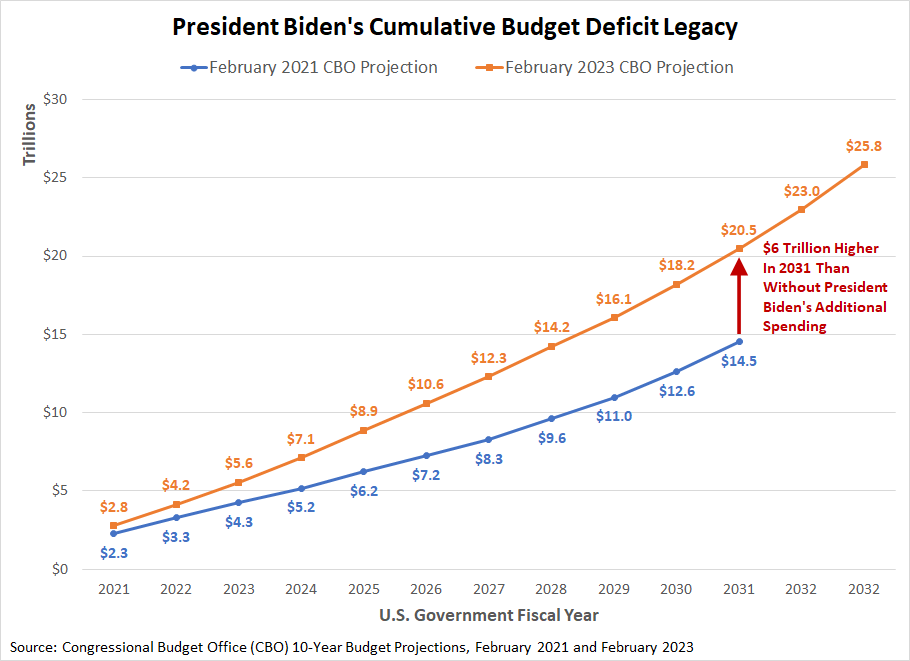President Biden’s Budget Deficit Legacy
The Congressional Budget Office creates a detailed 10-year budget projection of the U.S. government’s spending, revenues, and deficits every year. The CBO’s 10-year budget and economic outlook for 2023 are now out. This new report puts the lie to one of the most bizarre claims President Joe Biden made in his State of the Union address just ten days earlier.
Here’s the claim:
In the last two years, my administration has cut the deficit by more than $1.7 trillion—the largest deficit reduction in American history.
President Biden’s claim can only be true if the U.S. government planned to continue its crisis deficit spending to cope with 2020’s coronavirus pandemic forever. It is perhaps the most bizarre measuring stick that one could use to claim success in reducing budget deficits.
A Much Better Measuring Stick
The CBO’s ten-year budget and economic outlook reports provide a saner method for measuring President Biden’s success at reducing expected deficits. All we need to do is compare the CBO’s cumulative ten-year deficit projections from February 2021 with their latest deficit outlook.
The CBO’s ten-year budget outlook from 2021 details a reasonable projection of how big the U.S. government’s future deficits were expected to be at the beginning of Biden’s presidency. Any difference between these two cumulative projections will confirm how different the outlook for the federal budget deficit has become. That difference is the result of President Biden’s fiscal policies. The graph below reveals President Biden’s cumulative budget deficit legacy from his two years in office:
As you can see, there is no sign of any reduction in the U.S. government’s budget deficits. Worse, they mostly get bigger year after year. By 2031, the final year in the CBO’s budget outlook from February 2021, the nation’s cumulative deficits are $6 trillion larger than they would have been without President Biden’s fiscal policies.
That’s not what successfully reducing budget deficits looks like. That is a massive fiscal policy failure. It is no wonder President Biden ignored the nation’s biggest problem in his 2023 State of the Union speech. That problem is a direct result of his policies.
President Biden’s Failed Fiscal Policy Legacy
Writing at The Daily Signal, budget policy analyst David Ditch summarizes President Biden’s seven biggest contributions to the U.S. government’s projected budget deficits:
- The largest by far was the $1.9 trillion package of welfare expansions and bailouts in March 2021, which passed Congress with Democrat-only support. It was promoted as a response to COVID-19. In reality, the bill was a textbook example of political opportunism that took advantage of the pandemic to enact a raft of the Left’s priorities.
- The 2021 infrastructure package, which Biden regularly cites as an achievement, was loaded with budget gimmicks to hide its true cost and included many wasteful carve-outs for progressives. The Biden administration’s highly flawed and partisan implementation of the bill only has made things worse.
- Biden was happy to sign two omnibus appropriations packages, both of which were thousands of pages long, larded up with pork and unnecessary spending increases for the swamp, and included tens of billions in questionable non-military aid to Ukraine.
- The so-called Inflation Reduction Act, a mix of tax hikes and Green New Deal-style industrial subsidies, was designed in a way that will add to deficits over the first five years and add even more down the line if any of its spending is renewed. Incredibly, things would have been even worse if the originally planned “Build Back Better” debacle had become law.
- The COMPETES Act, supposedly about addressing challenges posed by China, was in fact a deficit-financed mess of corporate welfare and increased spending authorizations for federal “science” bureaucracies.
- The PACT Act started as a reasonable measure to assist veterans who suffered from toxic exposure, but was turned into a massive expansion for the government-run Veterans Affairs system with a huge price tag. Since veterans’ benefits are a core federal responsibility, Congress should have the decency to ensure the VA system is paid for rather than casually swiping the national credit card.
- Biden has enacted or is in the process of implementing several executive orders and regulations that add billions of dollars apiece to costs, leading to a mix of higher deficits and reduced purchasing power. These include a massive “Thrifty Food Plan” increase in food stamp benefits; college loan repayment deferrals and the still-pending forgiveness scheme; an Obamacare eligibility expansion; and more stringent rules for two types of labor mandates on infrastructure projects.
None of these policies happened by accident or in response to a real national emergency or crisis. These deficit-increasing policies result from President Biden’s choices during the last two years.
It is to his shame he’s leaving behind such a negative budget deficit legacy.



















